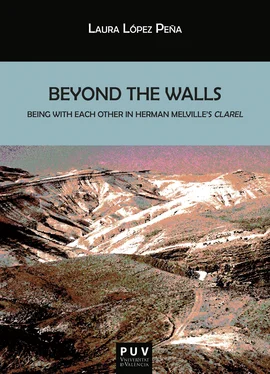Laura López Peña - Beyond the Walls.
Здесь есть возможность читать онлайн «Laura López Peña - Beyond the Walls.» — ознакомительный отрывок электронной книги совершенно бесплатно, а после прочтения отрывка купить полную версию. В некоторых случаях можно слушать аудио, скачать через торрент в формате fb2 и присутствует краткое содержание. Жанр: unrecognised, на английском языке. Описание произведения, (предисловие) а так же отзывы посетителей доступны на портале библиотеки ЛибКат.
- Название:Beyond the Walls.
- Автор:
- Жанр:
- Год:неизвестен
- ISBN:нет данных
- Рейтинг книги:3 / 5. Голосов: 1
-
Избранное:Добавить в избранное
- Отзывы:
-
Ваша оценка:
- 60
- 1
- 2
- 3
- 4
- 5
Beyond the Walls.: краткое содержание, описание и аннотация
Предлагаем к чтению аннотацию, описание, краткое содержание или предисловие (зависит от того, что написал сам автор книги «Beyond the Walls.»). Если вы не нашли необходимую информацию о книге — напишите в комментариях, мы постараемся отыскать её.
Beyond the Walls. — читать онлайн ознакомительный отрывок
Ниже представлен текст книги, разбитый по страницам. Система сохранения места последней прочитанной страницы, позволяет с удобством читать онлайн бесплатно книгу «Beyond the Walls.», без необходимости каждый раз заново искать на чём Вы остановились. Поставьте закладку, и сможете в любой момент перейти на страницу, на которой закончили чтение.
Интервал:
Закладка:
a hammock on the ocean is the asylum for the generous distressed. The ocean brims with natural griefs and tragedies; and into that watery immensity of terror, man’s private grief is lost like a drop. ( Israel Potter 437)
Man sprang from deserts: at the touch
Of grief or trial overmuch,
On deserts he falls back at need;
Yes, ’tis the bare abandoned home
Recalleth then. (Rolfe in Clarel 2.16.106-110)
Oceans, deserts, and also crowds pull every private grief within a universal wail. Melville’s project is to engage in the individualization of the uniqueness of each wail, without cutting their connection to a universal grief. The well-known lamentation of the narrator at the end of “Bartleby, the Scrivener”—“Ah Bartleby! Ah humanity!” (98)—may be said to capture the intermingling of both individual and universal grieving cries; while Hunilla’s empathic capacity to incorporate the pain of other beings into her own, out of the love she feels for her fellow creatures, fuses these different experiences of pain within a universal continuum that is, at the same time, part of the individual: “To Hunilla, pain seemed so necessary, that pain in other beings, though by love and sympathy made her own, was unrepiningly to be borne. A heart of yearning in a frame of steel. A heart of earthly yearning, frozen by the frost which falleth from the sky” (“Chola” 133).
Yet, at the same time that Melville emphasizes the interconnection of the particular and the universal, he also reflects characters’ impossibility to conceive such interconnection. Pointing to the democratizing potentiality of universalism to human relationships, Melville portrays the eventual withdrawal of most of his characters within their respective individual subjectivities, specific communities, and one-sided ways of thinking. This attitude perpetuates a reality of disconnection, reinforcing separation between different human beings and groups who cling to monolithic perspectives and dividing conceptions of humanity. Consequently, although Melville’s texts point to the democratizing potentiality of intersubjectivity and the real universality of human beings, visions of interpersonal separation impose themselves recurrently and harshly in Melville’s works. An example of this is how, in The Confidence-Man , the crew of the Fidèle , first an indistinguishable whole, is split into groups, pairs, and single individuals in merely a few lines: “the crowd, as is usual, began in all parts to break up from a concourse into various clusters or squads, which in some cases disintegrated again into quartettes, trios, and couples, or even solitaires; involuntarily submitting to that natural law which ordains dissolution equally to the mass, in time to the member” (847). This dissolution may be read positively, as a process by which the different individual parts that are invisible within the crowd are given visibility, yet also as an image of human segregation, maybe evoking the national divisions of antebellum U.S. merely four years before the Civil War, at the time The Confidence-Man was written and published. Similar to this image of intersubjective separation, yet in a reverse way, is the individual’s efforts to seek the sociality of other individuals and join in the couples, trios, quartets and larger units of the crowd. This process is parodied in Israel Potter’s attempts, in the homonymous novel, to join the different societies on board the English ship where he unexpectedly finds himself after equivocally jumping off the Ariel : “‘Boys, is this the way you treat a watch-mate’, demanded Israel reproachfully, ‘[…] Come, let’s be sociable. Spin us a yarn, one of ye. Meantime, rub my back for me, another’, and very confidently he leaned against his neighbor. ‘Lean off me, will ye?’ roared his friend, shoving him away” (579). Although Israel’s efforts to fraternize are portrayed in a comical way, the rejection of his interpersonal advances to join the different societies in the ship may be said to perform how the possibility to develop intersubjectivity (and, therefore, to develop universalism) is resisted by characters who withdraw to their own private societies and selves. This is a recurrent motif in Herman Melville’s writings, of which Clarel , in its portrayal of characters who fence up their egos and minds within hermetic walls that prevent any possibility of developing an intersubjective relationship with other characters, proves a good example. The potentiality of intersubjectivity, in such cases, remains undeveloped, and so does the possibility of plural thinking and democratic relationships. Despite such containment, however, the potentiality is not eliminated but persists. As anticipated earlier, Melville exposes the democratizing effects of such potentiality in works like Moby-Dick , where Ishmael and Queequeg’s intersubjectivity abolishes the (racial, religious, cultural) barriers by which the characters had initially felt separated, and enables a process by which Ishmael, first repulsed by the “savage” Queequeg, is eventually capable of regarding him as his equal and Queequeg’s worldviews as equivalent to his own. It is relevant that Melville rescues only Ishmael and Queequeg’s friendship from the self-destructive crusade of the Pequod ; Queequeg’s coffin being the only thing Ishmael can hold on to by the end of the novel and which preserves Ishmael’s life. Thus, despite the fact that Queequeg dies at the end of Moby-Dick , it is relevant that he should posthumously emerge from the sea in the form of his coffin in order to save Ishmael, as if fulfilling his nuptial promise to “gladly die for me [Ishmael], if need should be” (63). This will be an important difference with the final image of the swimmer rising from the deep in Clarel , as the young student will be grieving utterly alone, with nobody to help him endure the hardships of existence.
In fact, most Melvillean characters die alone and rejected, the victims of the thick walls they either encounter in their efforts to “fraternize” or which they erect against other characters’ efforts to establish an intersubjective relationship with them. Pointing to the potentially democratizing effects of intersubjectivity, Melville places in interpersonal relationships the possibility of universalism, at the same time that he shows how this potentiality is continuously canceled. Aware of both the possibilities and the difficulties, of the constructive potentiality of innate humanity and the destructive potentiality of innate depravity, Melville provides no magical recipe to the eliciting of democratic relationships and thinking. However, the fact that the author exposed himself and readers to a continuous analysis of both the possibility and the impossibility of human togetherness in texts as reflexive of monologic worldviews and depositions as they are encouraging of plural thinking, may be taken as indicative of the author’s persistence in the transformative effects of such project despite his pessimism. As I analyzed from a theoretical perspective, intersubjective universalism opens up the way for more democratic ethical possibilities in interpersonal relationships. The present study interprets the ethics Melville’s project points to as secular.
TOWARD A SECULAR ETHICS
As a subject central to Clarel it is necessary to consider Melville’s religiosity or attitude toward religion before elaborating my interpretation of the poem. The reason for this detour is that, despite not addressing religion and religiosity directly in the way other scholars have done, 4 this study focuses on Clarel ’s analysis of one-sided thinking, within which religious manias are particularly emphasized, together with the exclusive (and excluding) character of religious communities, the questioning of dogma, and the exploration of faith, spirituality, sincere devotion, doubt and unbelief.
Читать дальшеИнтервал:
Закладка:
Похожие книги на «Beyond the Walls.»
Представляем Вашему вниманию похожие книги на «Beyond the Walls.» списком для выбора. Мы отобрали схожую по названию и смыслу литературу в надежде предоставить читателям больше вариантов отыскать новые, интересные, ещё непрочитанные произведения.
Обсуждение, отзывы о книге «Beyond the Walls.» и просто собственные мнения читателей. Оставьте ваши комментарии, напишите, что Вы думаете о произведении, его смысле или главных героях. Укажите что конкретно понравилось, а что нет, и почему Вы так считаете.










